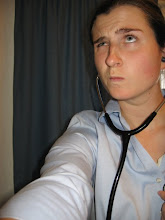
During my internal medicine rotation I had the opportunity to meet a wonderful woman and her beautifully strong family. I have changed many names and details of the case due to patient privacy laws, but hope that the emotional influence will come through.
Margaret (not her real name) was a relatively young woman who had moved to this area to care for an elderly relative. Recently she was diagnosed with a very aggressive type of cancer. She was scheduled to start chemotherapy which was hoped to extend her life a few months, but a cure was understood to be impossible. She was admitted to the hospital and I was assigned to be her medical student because she had some mental status changes/few falls. Our team's mission was to figure try to get her into shape so she could start chemotherapy. I met Margaret and performed a history and physical exam. During our conversation I was impressed by how friendly and witty she was. Her thinking was not completely clear, but her personality came through the interview. I was also privileged to meet members of Margaret's family and realized how close her family was. Our medical set out optimistically trying to find the cause of Margaret's mental status changes and ways make her feel better and strengthen her for chemotherapy.
We ran many many tests, and started giving Margaret several medications. However, the next day her thinking was worse and her symptoms such as nausea had become more severe as well. We tried changing/adding more medications but every day her mental status and body seemed to deteriorate. We racked our brains trying to come up with ideas, but nothing seemed to help. Days passed. Soon her interaction was limited due likely to a combination of her declining function and her pain medication. It felt like watching a car crash in slow motion - you knew what was going to happen and you desperately wanted to change it some how, but there was nothing we could do.
We asked the palliative care (pain control/end of life symptom management people) for help. They saw Margaret and told us that her symptoms and confusion were typical of someone who was dying of cancer. We had a family meeting with the palliative care team present and had to break the news to the family that chemotherapy was no longer on the table and that Margaret was likely to die soon. It was heart breaking to see the grief of the family, many of whom I had gotten to know. The palliative care team did a good job at trying to make the meeting hopeful - focusing on our ability to control Margaret's pain and other symptoms and making her as pain free as possible. Days passed and the family decided to put Margaret on Hospice. She was switched to comfort care before leaving the hospital. I wrote out the order: switch to comfort care: no more blood draws, vitals, unneeded injects, etc. After my intern signed the order I went to put it in her chart. As I was putting it in the binder, I almost broke down sobbing in front of all the nurses and personnel around the charts - I so desperately did not want my patient to die. Switching to comfort care almost felt like defeat to me. I managed to pull myself together long enough to make it to my car before breaking down into tears. The truth is that comfort care is not defeat, is the providing the best possible care to Margaret that we could provide - making her last days as pleasant and as pain free as possible.
Shortly after being transferred to Hospice, Margaret passed away. Her family called me to let me know and our team sent a card of condolence. Her family said that Hospice did an absolutely amazing job of making her last days as peaceful as they could. It was one of my first experiences with a patient that I was following closely dying. It was definitely a challenging experience, but as I reflect more, I realize that it was actually incredibly fulfilling as well.
It is definitely more difficult support a dying patient and their family, as it is easier to be liked as a medical student/physician when you are giving good news and seeing improvements instead of daily decline in a patient. However, even though you do not have the ability to cure the patient/make them better, you can still be a good health care provider by supporting the patient and the family as much as possible as they go through the decline, palliative care, death, and grieving process.
All in all, it was a challenging, but very rewarding experience that I am very grateful to have been able to take part in.




